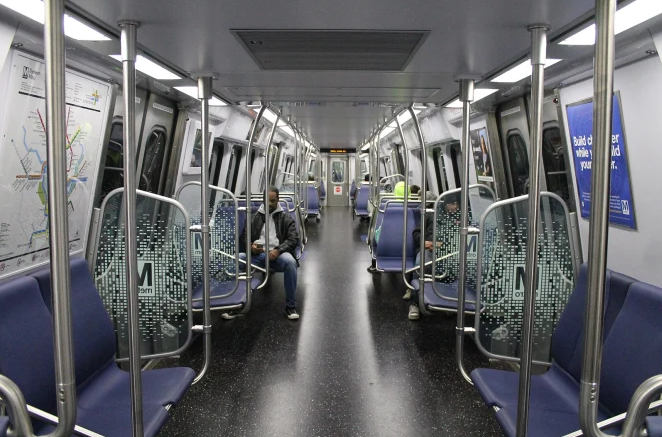Editor's note: This article originally appeared on Greater Greater Washington and is republished with permission.
DC Council took a step toward putting $100 per month on District residents’ SmarTrip cards Monday as the Committee on Transportation and the Environment voted unanimously in favor of the Metro for DC Amendment Act of 2021.
The program is designed to spur ridership and incentivize WMATA to deliver more reliable service by automatically enrolling all DC residents except for those with existing travel subsidies.
“For the essential worker who never stopped commuting and depends on the bus and train, this is going to be a much-needed boost to their family’s budget,” Councilmember Charles Allen (Ward 6), who introduced Metro for DC, said in a press release. “And for residents who have more options, this will help bring more people back to the Metro.”
Allen added: “But I want to be clear: low-cost or free service isn’t worth much if the system doesn’t meet riders’ needs. That’s why Metro for DC pairs this monthly transit subsidy with millions each year to improve bus and transit - especially in underserved neighborhoods - to improve service, reliability, frequency, and quality of the rides residents need.”
WMATA, however, would only get money from the program if riders spent it at the faregates. Government funds would only be used if District residents redeem the credits, which would refresh at the end of each month and go unspent if eligible residents chose not to ride.
During markup, Councilmember Christina Henderson (At-large) noted that for some people, cost is an obstacle to riding Metrorail, but for many, it’s reliability. Henderson said that nothing is more distracting to riders or more of a blow to WMATA than announcing six weeks of track work.
Allen began working on the law before COVID decimated Metrorail ridership, which is still beleaguered by mechanical issues, construction delays, and (non) commuting trends in the pandemic’s third year.
Now, Allen says, winning back ridership is more important than ever.
“It was an important idea then, but now as we recover, it’s now an imperative. Metro’s success means the District’s success, and this bill can help bring riders back and close the system’s revenue gap,” Allen noted during the hearing.
During Monday’s markup meeting, committee Chair Mary Cheh (Ward 3) said that “the likely cost is, frankly, considerable,” citing an estimate that the program would cost $163 million in fiscal year 2025. She added, though, that “it’s not cheap, but the repayment to us as a community will be more than worth it.”
Allen explained that the bill would be funded “the way every bill is funded,” through unbudgeted increases to projected revenue identified by the District’s Chief Financial Officer after the council approves each year’s budget. Allen made a point of clarifying that unbudgeted revenue increases are different from the surplus revenue after the end of the fiscal year, meaning it will not impact money dedicated to the Housing Production Trust Fund.
The bill also provides a $10 million Transit Equity fund for WMATA and the District Department of Transportation to improve bus and streetcar service, and prioritize underserved areas where people are dependent on public transit.
In an email to GGWash, WMATA spokesperson Sherri Ly said “Metro appreciates legislative initiatives that provide funding and improve services. When customers choose Metro it’s better for the region and our environment. We welcome all initiatives that encourage customers to choose Metro.”
Committee members Allen, Henderson, and Janeese Lewis George (Ward 4) voted unanimously in favor of the bill — Kenyan McDuffie (Ward 5) was not present for the vote.
Erik Salmi, Deputy Chief of Staff for Charles Allen, said that he is confident that the bill will get through during this legislative session. “Folks are excited about it,” Salmi said, adding that the bigger thing to note is that if the legislation doesn’t pass this fall the process will start all over again.
The bill will now move onto the Committee of the Whole for further markup before two rounds of voting. Council Chairman Phil Mendelson has not yet scheduled a hearing to consider Metro for DC.
John Besche is a DC-based writer who reports on religion, urbanism, the confluence of the two, and a little bit of everything in between. Follow him on Twitter @JohnBesche.






